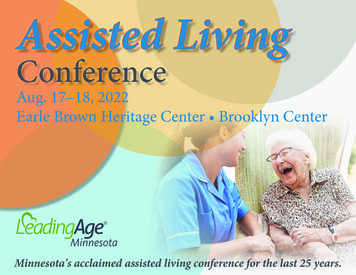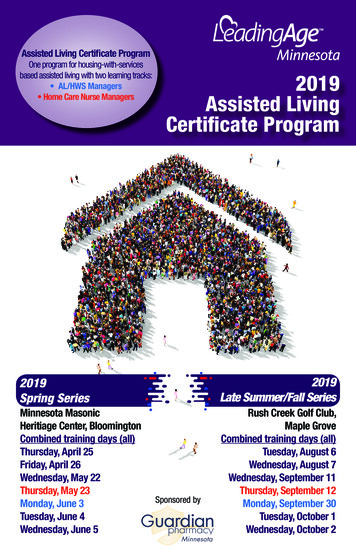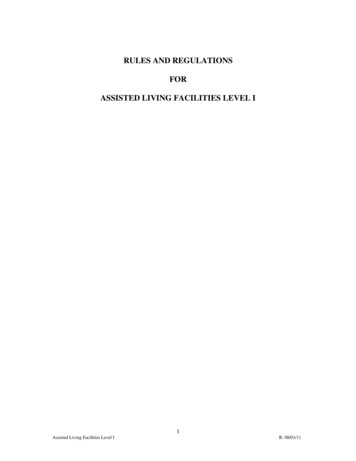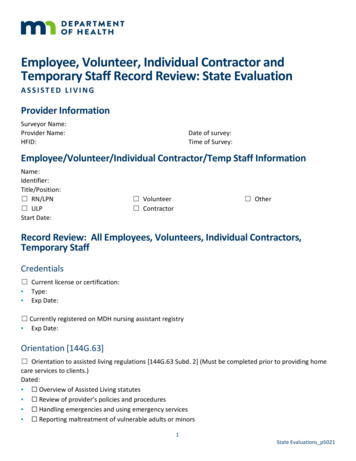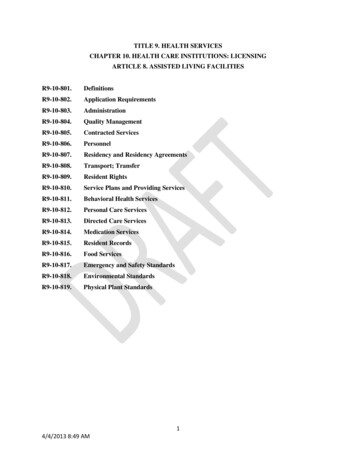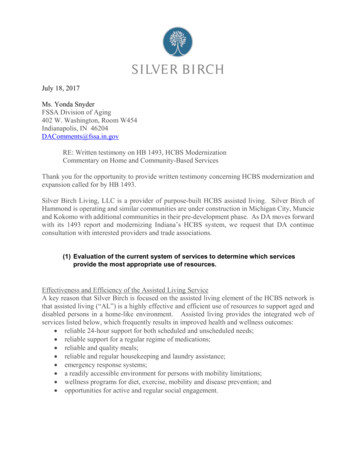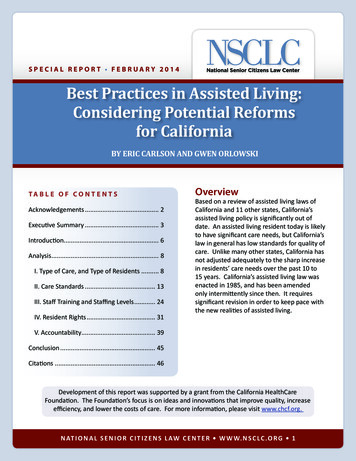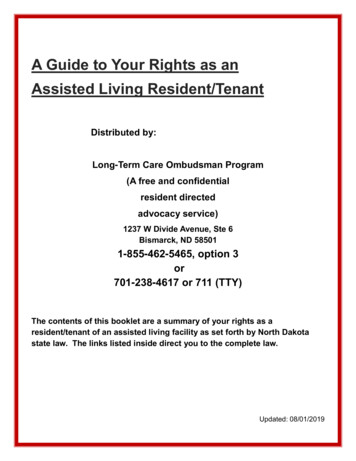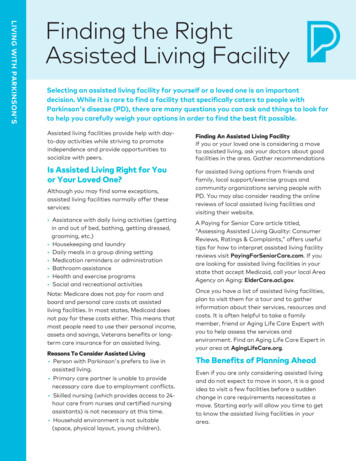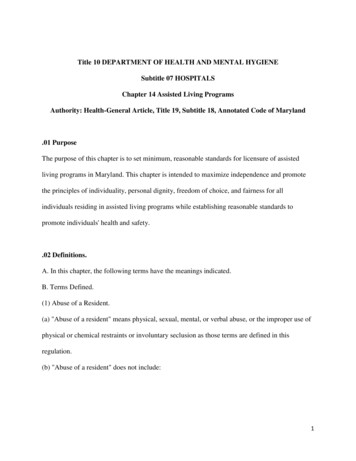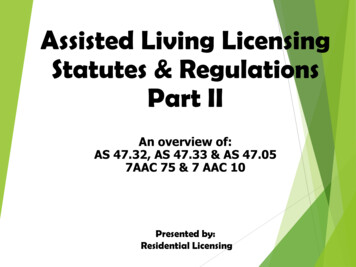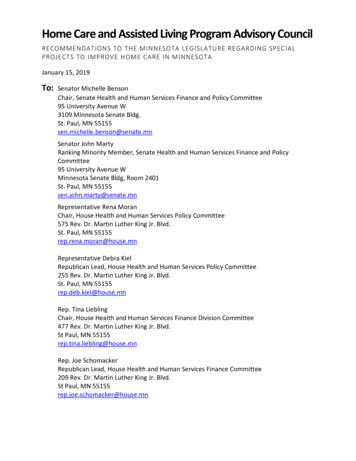
Transcription
Home Care and Assisted Living Program Advisory CouncilRECOMMENDATIONS TO THE MINNESOTA LEGISLATURE REGARDING SPECIALPROJECTS TO IMPROVE HOME CARE IN MINNESOTAJanuary 15, 2019To:Senator Michelle BensonChair, Senate Health and Human Services Finance and Policy Committee95 University Avenue W3109 Minnesota Senate Bldg.St. Paul, MN 55155sen.michelle.benson@senate.mnSenator John MartyRanking Minority Member, Senate Health and Human Services Finance and PolicyCommittee95 University Avenue WMinnesota Senate Bldg, Room 2401St. Paul, MN 55155sen.john.marty@senate.mnRepresentative Rena MoranChair, House Health and Human Services Policy Committee575 Rev. Dr. Martin Luther King Jr. Blvd.St. Paul, MN 55155rep.rena.moran@house.mnRepresentative Debra KielRepublican Lead, House Health and Human Services Policy Committee255 Rev. Dr. Martin Luther King Jr. Blvd.St. Paul, MN 55155rep.deb.kiel@house.mnRep. Tina LieblingChair, House Health and Human Services Finance Division Committee477 Rev. Dr. Martin Luther King Jr. Blvd.St Paul, MN 55155rep.tina.liebling@house.mnRep. Joe SchomackerRepublican Lead, House Health and Human Services Finance Committee209 Rev. Dr. Martin Luther King Jr. Blvd.St Paul, MN 55155rep.joe.schomacker@house.mn
HOME CARE AND ASSISTED LIVING PROGRAM ADVISORY COUNCILRECOMMENDATIONS TO THE MINNESOTA LEGISLATUREM. Catherine GriffinManager: Home Care and Assisted Living ProgramMinnesota Department of Healthcathy.griffin@state.mn.usSusan WinkelmannAssistant Division Director Health Regulation DivisionMinnesota Department of HealthSusan.Winkelmann@state.mn.usIntroductionThe Home Care and Assisted Living Program Advisory Council is directed by statute to makeannual recommendations to the Minnesota legislature for special projects to improve homecare in Minnesota. The legislature may elect to make an appropriation to fund these projectsfrom revenue collected from fines as outlined in Minnesota Statute 144A.474.The Council met on several occasions to discuss areas of concern for consumers of home care,the challenges of home care providers and the current practices and challenges of the HomeCare and Assisted Living Program (HCALP). The Council’s expressed goals are to create anenvironment in which the Minnesota Department of Health (MDH) and home care providersare enabled to:1) act preemptively to prevent harm, and2) collaborate to assure positive outcomes for consumers of home care in all settings.Statute References144A.474 SURVEYS AND INVESTIGATIONS. Subd. 11. Fines.(i) Fines collected under this subdivision shall be deposited in the state government specialrevenue fund and credited to an account separate from the revenue collected under section144A.472. Subject to an appropriation by the legislature, the revenue from the fines collectedmust be used by the commissioner for special projects to improve home care in Minnesota asrecommended by the advisory council established in section 144A.4799.144A.4799 MDH LICENSED HOME CARE PROVIDER ADVISORY COUNCIL. Subd. 3 Duties.(c) The advisory council shall annually review the balance of the account in the stategovernment special revenue fund described in section 144A.474, subdivision 11, paragraph (i),and make annual recommendations by January 15 directly to the chairs and ranking minoritymembers of the legislative committees with jurisdiction over health and human servicesregarding appropriations to the commissioner for the purposes in section 144A.474, subdivision11, paragraph (i).2
HOME CARE AND ASSISTED LIVING PROGRAM ADVISORY COUNCILRECOMMENDATIONS TO THE MINNESOTA LEGISLATURERevenue Collected from Home Care FinesFiscal Year20142015201620172018 (partial)TotalPenalty Assessments Collected 41,665.00 56,900.00 144,200.00 136,037.50 84,618.00 463,420.50Council Recommendations:Background InformationThe Home Care and Assisted Living Advisory Council was established to advise MDH onpotential changes in statute and/or policy to improve the delivery of home care in Minnesota. Italso is charged with making recommendations to the MN Legislature regarding potentialallocation of funds collected in fines from the enforcement actions by MDH licensing surveys.In light of all the activity that is happening with regard to the topics of elder abuse and potentialassisted living licensure, the Council is focusing its recommendations to align with the goals ofhelping providers improve the quality of care for clients and residents and to give consumersmore tools to evaluate providers and make better, more informed decisions about the carethey receive.The Council believes that one of the critical, key factors that is negatively impacting the deliveryof care in all settings is the shortage of labor in the home care space. Both providers andconsumers are affected. The Council is steering its recommendations toward activities that willattempt to mitigate the impact of this shortage, which is only going to continue to be an issueaffecting the industry. The Council’s recommendations will encourage people to consider homecare as a career, attempt to create efficiencies to minimize the effect of labor shortage,improve information available to consumers and help MDH be more efficient in surveyinglicensed providers.Recommendation 1: Desk Audits for Level 1 and Level 2 Correction OrdersThe Council recommends that MDH change the survey process to allow all level 1, and level 2violations that do not raise any safety concerns, in provider surveys to be corrected by deskaudit, reducing the amount of time spent by surveyors on administrative violations, thus freeingup more time for surveys. Rather than having surveyors return to the agency, follow-upsurveys can be completed by fax or email. Because these types of violations are primarilyadministrative in nature, it would save surveyors time by having corrective actionscommunicated to them by the agency rather than physically sending the surveyor out to thesite to confirm the correction. Examples might include missing signatures on service plans;3
HOME CARE AND ASSISTED LIVING PROGRAM ADVISORY COUNCILRECOMMENDATIONS TO THE MINNESOTA LEGISLATUREThe Council would also like to have these corrections documented in the survey resultsavailable to the public. Rather than indicating that response is not necessary, indicate that aresponse was completed and approved by MDH.Recommendation 2: Education Program for Existing LicenseesThe Council recommends that the legislature appropriate funding to develop a training programfor existing licensed home care providers that is directed at management and supervisorypersonnel who are involved in direct care or supervising those involved in direct care. It isintended that the primary audience for this training would be new personnel or individuals innew positions within an existing licensee’s organization. However, given that MDH surveyorsreport that they have seen a distinct deficit of knowledge on the part of higher level personnelas well, the program should not be limited only to direct care supervisory staff.While there are a number of self-help tools for providers on the Department’s website, noofficial training is offered. Opportunities for training programs might include workshops, elearning tools and webinars. The Council believes that there is statutory authority to requireproviders participate in training, but if it is determined that there is not, the training could bevoluntary.Additional considerations for an education program include: The Department will issue a request for proposals (RFP) to outside agencies to developthe training. Two potential ideas are listed below for illustration purposes, but outsideagencies are encouraged to be innovative and creative with their proposals and shouldnot be limited to the below examples.The training could be modeled after a recent joint training conducted by Licensing andCertification (at MDH) and the Centers for Medicare and Medicaid;Alternatively, a program like the Department of Human Services “Steps for Success”could serve as a model.The Council will be a part of the RFP development, proposal review andrecommendation for approval process.Providers could be incentivized to participate in training through a credit or a reductionin their license renewal fee.The majority of the funding necessary for this recommendation would be in the development ofthe program, likely in the first year or two. Once the program is completed and in place, thenecessary funding in subsequent years will drop as the program would only need to beadministered and updated. The Council requests a Year 1 appropriation of up to 200,000.00.4
HOME CARE AND ASSISTED LIVING PROGRAM ADVISORY COUNCILRECOMMENDATIONS TO THE MINNESOTA LEGISLATURERecommendation 3: Home Care Career PathEven though MDH has indicated that the workforce shortage is not part of their mandate, theCouncil believes that the workforce shortage has a direct effect on the availability and quality ofcare and therefore is an area in which MDH should actively participate. The Council believesthat MDH should demonstrate leadership in attempts to encourage students to pursue homecare as a vocation or career, including partnering with other entities that are already active inpromoting such occupations. The Council also believes that there is a lack of knowledge andinformation for nursing students as to the career opportunities in home care. Efforts need tobe made to connect future nurses with the availability of great career opportunities in homecare. Suggestions for how to do this include: Promote and/or collaborate with existing scholarship programs to provide moreopportunities for students interested in careers in home care.Collaborating with Minnesota State Colleges and Universities to allow high schoolstudents to obtain college credit for training and/or work in home care.Educating students and adults identified as non-traditional workers on the path to acareer in home care through outreach and promotion.Collaborate with nursing schools to promote home care as an excellent careeropportunity.Encourage/promote home care as a clinical opportunity in nursing programs.Have home care recipients share their stories to demonstrate the value of a career inhome care.Implement Summer Health Care Intern internship program as described in MN Statute144.1464.Recommendation 4: Training and Administrative PortabilityOnboarding a new employee can take considerable time and expense. In the current workforceshortage, employees are often moving from job to job and at each new job, they are requiredto complete required training and admirative items such as background checks, fingerprinting,and TB testing. Portability of training and administrative items would allow employees tochange jobs and work additional jobs without having to go through a long onboarding processthat is a repeat of one they have already completed, often very recently. In some instances, thecosts of these items are borne by the employee. Whether or not the costs are paid by theemployer, the employee has to spend the time completing the tasks and in the event of thetwo-step TB test process, the employee has to make up to four trips to the testing facility and ifthe employee does not complete any part of the testing within the time frames required, theprocess must start over, further delaying the onboarding and costing the employer more. TBtesting and background checks/fingerprinting are universal and do not require additionalconsiderations. Through NetStudy 2.0, the employee is already in the system, it would just be a5
HOME CARE AND ASSISTED LIVING PROGRAM ADVISORY COUNCILRECOMMENDATIONS TO THE MINNESOTA LEGISLATUREmatter of adding them to the new employer. Training, in order to be portable, must bestandardized.The first part of the Council’s recommendation is to allow portability of TB testing, NetStudy 2.0including fingerprinting, and training. The second part of the recommendation is to establish astandardized training program ensuring continuity across organizations.The Council recommends that MDH issue a request for proposals (RFP) for trainingorganizations to create a standardized training program that a provider can choose to use and ifso, that training becomes portable to the employee. The following parameters arerecommended. The provider must purchase the training program from the chosen vendor, butparticipation is completely voluntary. The provider can continue to train as before, buttheir training will not be portable.Individual company policies and procedures are not part of this training. The providermust still do these on their own. Personal Care skills and nurse delegated tasks will stillneed to be trained/demonstrated as before.The Council would also recommend that during the provider’s survey, if the provider haschosen to use the approved training, the surveyor would be able to verify that the training hadbeen done and would not need to evaluate the content of the training, thus making the surveyprocess move faster.Recommendation 5: Improve Communication to the ConsumerConsumers have indicated that it is not easy to find a provider from using the MDH site. Thereis only a listing of available providers and survey results. Assuming they find a provider, theydon’t know what services they are able to provide, especially if they have needs that are veryspecific and/or complex. Rather than trying to redo the MDH website, there are some slightchanges that could be made to make finding an appropriate provider easier for the consumer.Consumer don’t always understand what is available and what the terminology commonly usedby MDH and providers means to them. In order to make this process easier for the consumer,the Council recommends the following: Define on the MDH website the different levels of available care, i.e. Basic Home Careand Comprehensive Home Care and the general services they offer. The type of servicesthat are offered are included in the FAQ’s, but unless consumers know what questionsto ask, they may have trouble finding the answers.Link to MinnesotaHelp.info (www.mnhelp.info) where the consumer can find providersthat offer the services they seek.6
HOME CARE AND ASSISTED LIVING PROGRAM ADVISORY COUNCILRECOMMENDATIONS TO THE MINNESOTA LEGISLATURE Link back to MDH’s site so that they can see survey results and other information ontheir chosen provider(s).Recommendation 6: Standardized FormsThe Council recommends that MDH create standardized forms that would be optional forproviders to use. If the providers choose to use these forms, then they can be assured that ifthey are filled out completely, they should be in compliance. Providers using these forms willalso allow the surveyor to work through the survey faster as they will not need to evaluate theforms for required items, only for completion. Examples of forms could include: Service PlanDisclosuresReassessment formsAbuse Prevention Evaluations and PlansRecommendation 7: Review of Most Cited Items in SurveysThe Council has observed over time that the same items seem routinely to be the top citeditems. The Council believes that when the same items are continually cited, the problem maylie with how the statute governing that item is written, and/or how it is being interpreted. TheCouncil recommends that the Department and the Council collaboratively examine the mostcited items and determine if there is something that can be changed administratively, whichcan be done relatively quickly, or if statutory change is needed, which would take higher levelaction. This process should take place as a part of the review of most cited items that isreported at each Council meeting. If it is determined that action can be taken, it can bedetermined how that should take place.Recommendation 8: Grant Money for Improvement ProjectsThe Council believes that an organization that wants to improve its processes in order tocorrect systemic deficiencies may benefit from some financial help in doing so. The Councilwould recommend that a portion of the funds collected from enforcement actions be used tocreate a grant program to allow providers to apply for a grant to fund an improvement programthat addresses the area of deficiency.7
HOME CARE AND ASSISTED LIVING PROGRAM ADVISORY COUNCILRECOMMENDATIONS TO THE MINNESOTA LEGISLATUREStatutory AuthorityThe Council believes that statutory authority exists to allow each one of the aboverecommendations to be considered. The Council has included the listing of its duties understatute 144A.4799 below for reference.Subd. 3.Duties.(a) At the commissioner's request, the advisory council shall provide advice regardingregulations of Department of Health licensed home care providers in this chapter, includingadvice on the following:(1) community standards for home care practices;(2) enforcement of licensing standards and whether certain disciplinary actions are appropriate;(3) ways of distributing information to licensees and consumers of home care;(4) training standards;(5) identifying emerging issues and opportunities in the home care field, including the use oftechnology in home and telehealth capabilities;(6) allowable home care licensing modifications and exemptions, including a method for anintegrated license with an existing license for rural licensed nursing homes to provide limitedhome care services in an adjacent independent living apartment building owned by the licensednursing home; and(7) recommendations for studies using the data in section 62U.04, subdivision 4, including butnot limited to studies concerning costs related to dementia and chronic disease among anelderly population over 60 and additional long-term care costs, as described in section 62U.10,subdivision 6.(b) The advisory council shall perform other duties as directed by the commissioner.(c) The advisory council shall annually review the balance of the account in the stategovernment special revenue fund described in section 144A.474, subdivision 11, paragraph (i),and make annual recommendations by January 15 directly to the chairs and ranking minoritymembers of the legislative committees with jurisdiction over health and human servicesregarding appropriations to the commissioner for the purposes in section 144A.474, subdivision11, paragraph (i).8
HOME CARE AND ASSISTED LIVING PROGRAM ADVISORY COUNCILRECOMMENDATIONS TO THE MINNESOTA LEGISLATURERespectfully submitted on behalf of council by:Jarrod PetersonJanuary 15, 2019DateHome Care and Assisted Living Program Advisory Council MembersRene Cronquist, Minnesota Board of NursingSamantha Drost, Public MemberCheryl Hennen, Ombudsman for Long Term CareJarrod Peterson, Licensed Home Care ProviderMelissa Plachecki, Licensed Home Care ProviderSusan Morgan, Licensed Home Care Provider9
Chair, Senate Health and Human Services Finance and Policy Committee . 95 University Avenue W . 3109 Minnesota Senate Bldg. St. Paul, MN 55155 . sen.michelle.benson@senate.mn. Senator John Marty . Ranking Minority Member, Senate Health and Human Services Finance and Policy Committee 95 University Avenue W . Minnesota Senate Bldg, Room 2401
